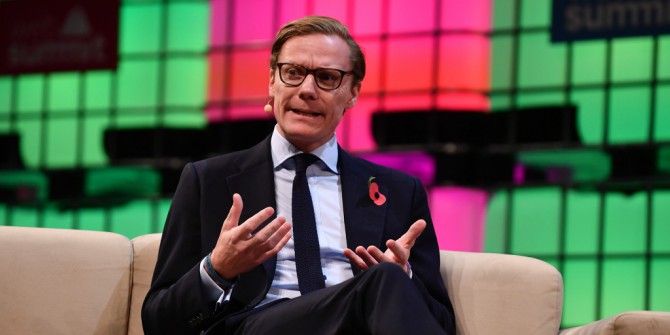Access to financial markets has never been easier. The same can be said about the spread of misinformation, facilitated by social media and technology. Erhan Kilincarslan and Jiafan Li write that the worship of influencers by Gen X, Y and Z may lead to new potential market manipulation strategies. They caution the different generations to exercise judgement on the overwhelming information in financial markets.
Stock market technologies have continuously evolved throughout the generations. Gen X have witnessed passionate traders checking ticker tape through the trading floor in the 1970s and the booming of telephone or telegraph orders in the 1980s. Gen Y have experienced electronic trading with the rapid growth of the world wide web in the 1990s and 2000s. And Gen Z have been trading by a light touch on the screen, exposed to the ChatGPT breakthrough in the 2020s.
Does that mean that our financial markets are becoming more efficient? You may receive different answers from different generations. But since the establishment of the first stock exchange in Amsterdam in 1602, one thing has persisted: stock manipulation. Misinformation always finds a way in because of ever-changing information dissemination approaches. Two factors facilitate the dissemination of misinformation in today’s financial markets: social media and technological advancement.
Table 1. Which generation are you?

Source: The Center for Generational Kinetics
Social media
Before the 2000s, insiders, traders and institutional investors used to disseminate misleading information or rumours through transactions, social network and online message boards. Today, financial information spreads very fast through online services and social media. According to a report from Ofcom, the UK media watch dog, individuals from Generations X, Y and Z, particularly Gen Z, dedicated an average of 151 minutes a day to social media for socialising and accessing news.
Figure 1. Average daily time spent (in minutes) by 16-64 years on social media worldwide 2012-2023

Source: Statista (2024a)
Investors from Gen X, Y and Z with no interest in individual research have different choices for their financial decision-making. Those from Gen X and Y seek investment advice on copy trading platforms, by “replicating the trades of other, often more experienced traders in real time”. The average age of some platform users is 34 years old. After the launch of ChatGPT in 2023, trading activity in AI stocks has increased 60 per cent among over-55 investors. Copy trading users tend to follow “gurus” based on “names” and their spectacular returns, but the underlying risks are not mentioned by the platform, which concerns regulators.
According to the Financial Times’ Financial Literacy and Inclusion Campaign, Gen Z turns to TikTok and Instagram for financial advice. Those without financial literacy are easily attracted to a fantasy world promoted by social media influencers. The intention, education and experience of some influencers remains dubious, especially when they offer financial advice and guidance on risky investments like cryptocurrency and stocks.
The passion and worship of Gen X, Y and Z towards influencers or gurus may lead to new potential manipulation strategies and regulators have already kept an eye on it. In 2022, the SEC filed charges against eight social media influencers, accusing them of participating in a $100 million stock manipulation scheme on Discord and Twitter. The global influencer marketing spending reached $38.08 billion in 2023, targeting 4.89 billion global social media users, a cohort estimated to grow to 5.85 billion by 2027. As social influencers become more prominent, manipulators may have more chances to implement creative and hidden manipulation plans.
In 2023, Shell is estimated to have allocated $270 million towards online games and social media influencers to endorse traditional fuels, specifically targeting Gen Z individuals of driving age. This strategy may have the potential to influence public perceptions of climate change and, in turn, contribute to the stabilisation of Shell’s share prices. However, authorities’ current oversight of the standards of information-sharing lags these developments.
Figure 2. Number of global social network users (in billions) 2017-2027

Source: Statista (2024c)
Technological advancement
From pump-and-dump and wash trade in the 1970s to spoofing in the 2000s, Gen X and Y have witnessed stock manipulation cases occurring on the trading floor in various exchanges. But it is already hard for regulators to keep up with evolving stock manipulation strategies and techniques. For instance, although the Korean Securities Exchange 2003 Act prohibited spoofing orders, even if an attack was detected, manipulators were punished for market price disruption, rather than being prosecuted for spoofing manipulation, due to various difficulties.
Technology removes trading barriers and gives millions of online users, especially Gen Y and Z, commission-free trading opportunities through online trading platforms and “neobrokers”. But it also allocates risks to individual traders without informing them. Gen Y prefer traditional stock trading on Robinhood, whose users were, on average, aged 35 to 44 in 2021, while Gen Z are more interested in cryptocurrency exchanges to gain much higher returns on Coinbase in the US in 2022.
The UK Financial Conduct Authority found that those apps would send frequent notifications with the latest news and other promotion messages to push users to invest in riskier instruments. Al can gather and analyse users’ trading patterns, preferences and emotions, but there is scepticism regarding the purpose and utilisation of this data. Such practices indeed raise concerns about the potential for market manipulation as individual users are exposed to greater risks. Regulators, like the FCA, play a crucial role in addressing these risks to ensure the integrity of financial markets and protect investors from manipulative practices.
You can access financial markets more easily in more ways than you would have been able to 20 years ago. Free and accessible information does not guarantee good investment and return, because there is no such thing as a free lunch. Always pay attention to exercising your judgement on the overwhelming information in financial markets. Whatever generation you are, just like G.K. Chesterton said, ‘do not be so open-minded that your brains fall out’.
- This blog post represents the views of the author(s), not the position of LSE Business Review or the London School of Economics and Political Science.
- Featured image provided by Shutterstock
- When you leave a comment, you’re agreeing to our Comment Policy.





